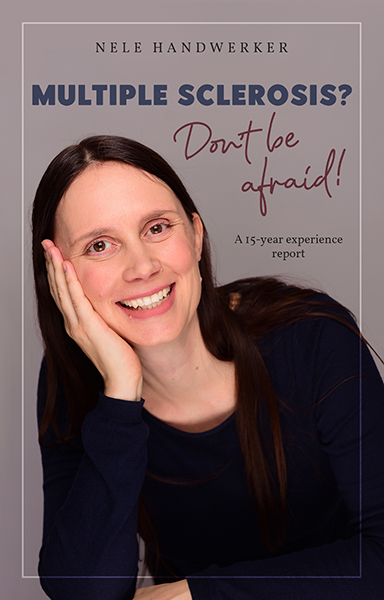Prof. Celia Oreja-Guevara advises women with multiple sclerosis and the desire to have children once a week at the University Hospital San Carlos in Madrid. It is best if the MS has been under control for two years. Then the chances of having a relaxed pregnancy are very good.
As women with MS are on average somewhat older at birth, artificial insemination plays a role. The recommendation is to choose the slightly more expensive in-vitro option, as it has a higher chance of success and couples can save time and disappointment.
In general, it has been shown that motherhood hardly affects the long-term course of the disease and that nothing stands in the way of this important part of life’s happiness for many people. Modern, effective therapies control even highly active courses very well.
Those who wish to breastfeed can do so. Nevertheless, health should always come first and if it becomes difficult or very time-consuming, whether for therapeutic or other reasons, you can fall back on substitute milk without a guilty conscience. It is better to prevent relapses and possible long-term effects than to breastfeed at all costs. Dive deeper into the various topics around pregnancy, lactation and immunotherapy for women with MS.
Klicken Sie auf den unteren Button, um den Podcast zu laden.
Table of Contents
Introduction – Who is Prof. Celia Oreja-Guevara?
I am Celia Oreja-Guevara, Vice Chair of Neurology and Head of Multiple Sclerosis Center at the University Hospital San Carlos, Madrid, in Spain.
I am Professor of Neurology at the University Complutense, Madrid.
After gaining my medical degree from the University of Madrid, I completed my PhD thesis in Neuroimmunology at the Max Planck Institute of Neurobiology in Munich, Germany.
I then completed a residency in the Department of Neurology at the University of Bochum, Germany, followed by a one-year fellowship in neuroimaging at the University Hospital San Raffaele in Milan, Italy. Since then, I have held several posts, including Senior Neurologist at the University of Dusseldorf, Germany, Head of Neurology at Hospital de Fuenlabrada, and Chair of the Multiple Sclerosis Center at University Hospital La Paz, both in Madrid, Spain. I am the Co-Chair of the Scientific Panel on Multiple Sclerosis for the European Academy of Neurology.
My main areas of research interest are clinical and neuroimaging correlations in MS, family planning, the use of optical coherence tomography in symptomatic therapy, neuromyelitis optica (NMO), and the evaluation of new drugs for the treatment of MS and NMO.
My hobbies are technology, buy gadgets, repair computer, visit technological exhibitions…
On the other hand, I like travel everywhere and to watch comedy and love films.

General information about the desire to have children with MS
What is the impact of MS on women's fertility?
Multiple sclerosis does not impact a woman’s fertility.
There is controversy over whether the anti-Müllerian hormone is reduced or not in women with MS, but there is no clear evidence.
What clearly impacts fertility is age, just as in healthy women, but perhaps age has a more significant impact on these women because they have children later, waiting for their disease to be stable. In our cohort, women with MS become pregnant with their first child on average about two years later than healthy women.
Why did women with MS used to be advised against pregnancy and what later findings led to a change in thinking?
Women were advised against becoming pregnant because the pathogenesis of the disease was not well understood, and because there was a study published in 1998 that reported a 30% increase in flare-ups during the postpartum phase. The problem with this study is that the women with MS were not receiving treatment.
Things changed with the advent of DMTs (Disease-Modifying Therapies) and studies showing that if patients were without disease activity and treated before pregnancy, they had a low risk of flare-ups in the postpartum period. In our cohort, only 7% had disease activity.
What is the specific impact of pregnancy on MS activity and possible disability increase?
There is no scientific evidence that pregnancy increases the activity of MS or disability. There are only non-scientific studies with very few patients.
How important is a detailed consultation with a neurologist when the desire to have children becomes apparent?
A detailed consultation with a neurologist becomes crucial when the desire to have children becomes apparent, primarily due to the necessity of planning the pregnancy meticulously. This planning is essential to decide the optimal timing for suspending or possibly continuing treatment, ensuring it aligns with the most suitable period for childbearing—typically when the disease is stable, marked by two years without flare-ups. It’s also vital to determine when to discontinue contraceptive use and the most appropriate time postpartum to reintroduce treatment. We conduct a dedicated family planning consultation every Monday, where these topics are thoroughly addressed. This approach ensures that prospective parents receive the best possible advice and support, tailored to their unique situation and the specific demands of managing a neurological condition alongside family planning.
Specific information on childbearing and pregnancy with MS
Is artificial insemination an option for women with MS? And how can the risk of a relapse be minimized?
We need to highlight the importance of early preconception counselling, the management of disease-modifying therapies before and during assisted reproductive techniques.
We recommend in vitro fertilization is economically more costly than artificial insemination but has a higher live birth rate (LBR) per cycle. A subclass of IVF, intracytoplasmic
sperm injection (ICSI), is the most widely used fertility technique in developed countries. In addition, a single embryo transfer in IVF-ICSI could avoid the risk associated with multiple pregnancies.
What is the general recommendation regarding disease-modifying therapies for women with MS who want to have children?
The general recommendation regarding disease-modifying therapies (DMTs) for women with MS who wish to have children is that it highly depends on the specific treatment involved. Some treatments are teratogenic and must be discontinued well before conception to avoid any risk to the developing fetus. Other medications can be safely stopped closer to the time of conception, while there are some that, if the benefits outweigh the risks, may be continued during pregnancy. It’s crucial to carefully read the prescribing information of each medication and consult with a neurologist. This personalized approach ensures that both the health of the mother and the safety of the developing fetus are prioritized, balancing the need for ongoing MS management with the desires and plans for pregnancy.
What are the potential risks to mother and child when using or avoiding DMTs and how can they be balanced?
It highly depends on the specific treatment involved.
It’s essential to have a woman with MS in good health, capable of caring for her child.
Why may it be important to change therapy due to the desire to have children?
Changing therapy due to the desire to have children is crucial, especially since some treatments for multiple sclerosis (MS) are teratogenic and can harm the foetus. It’s essential to carefully and strategically modify or discontinue certain treatments not only to avoid exposing the developing baby to potential risks but also to prevent the possibility of rebound effects. Rebound effects can occur with the abrupt cessation of some MS therapies, leading to an exacerbation of disease activity that could adversely affect the mother’s health. Therefore, any change in treatment must be carefully planned and executed under the guidance of a healthcare professional, ensuring both the mother’s and the baby’s safety and well-being throughout the pregnancy and beyond.
What medications are officially approved for use during pregnancy and lactation? And do others exist where there is limited continuation possible?
Some treatments are not contraindicated during pregnancy and lactation, while the continuation of others is possible if the benefits outweigh the risks, requiring careful consideration. Treatments such as teriflunomide and S1P inhibitors are teratogenic and generally not recommended during pregnancy.
What is your recommendation to women with active or highly active MS who want to have children?
For women with active or highly active MS who wish to have children, my recommendation is to aim for a stable condition with no clinical or radiological activity for two years.
During this period, treatment with a monoclonal antibody may be advisable to manage the disease effectively while planning for pregnancy.
What should be done if one does become pregnant on a drug that poses potential risks to the child?
If one becomes pregnant while on a drug that poses potential risks to the child, it’s important to provide information backed by substantial scientific evidence regarding pregnancies under the same treatment. This includes sharing results from international or national pregnancy registries related to the specific medication. The patient should be equipped with all the necessary and adequate information so that they can make an informed decision regarding their pregnancy.
What is the risk of relapses in mild MS if therapy is completely discontinued for the duration of pregnancy?
Minor risk.
What are the effects of vitamin D on mother and child during pregnancy and lactation and what are the recommendations?
Regarding the effects of vitamin D on the mother and child during pregnancy and lactation, we follow the recommendations of gynecologists. They advise taking vitamin D daily, either in pill or liquid form, avoiding concentrated or slow-release (retard) formulations. This approach ensures both the mother and child receive the necessary levels of vitamin D.
What is the current recommendation for treating a relapse during pregnancy or breastfeeding?
The current recommendation for treating a relapse during pregnancy or breastfeeding includes the use of corticosteroids, with particular caution advised during the first trimester to minimize any potential risks to the developing fetus. Additionally, plasmapheresis is considered an option, especially in cases where corticosteroids are not suitable or have not been effective.
Breastfeeding with multiple sclerosis
What are the benefits of breastfeeding for both child and mother?
Breastfeeding offers significant benefits for both the child and the mother. It appears that exclusive breastfeeding may provide a protective effect that could potentially reduce the risk of MS relapses in the mother. This benefit has been observed in most publications that involve mild disease-modifying therapies (DMTs) previous conception. There is very few experience with patients treated with high efficacy treatment previous the pregnancy.
What medications are currently approved for breastfeeding? And do others exist which can be used under certain precautions?
Interferon beta, Glatiramer acetate, and Ofatumumab are not contraindicated for breastfeeding. However, it’s important to consult the prescribing information and guidelines from regulatory authorities such as the EMA (European Medicines Agency) and the FDA (U.S. Food and Drug Administration), as their recommendations may differ. Other medications might also be used under certain precautions, emphasizing the necessity of reviewing the technical datasheets and consulting with healthcare professionals to ensure safety for both the mother and the child during breastfeeding.
Are there any reasons where you would advise against breastfeeding and if so, what are they?
Patients with a very active disease before pregnancy or patients with relapses during the pregnancy.
Farewell
Is there anything else you would like to share with the listeners?
For patients with Multiple Sclerosis, becoming pregnant is absolutely possible with the right preparations. Therefore, engaging in thorough family planning is crucial to manage both the disease and the pregnancy effectively, safeguarding the health of both the mother and the baby.
How and where can interested people follow your research activities?
Many thanks for the positive insight views into the topic of pregnancy and lactation with MS.
See you soon and try to make the best out of your life,
Nele
For more information and positive thoughts, subscribe to my newsletter for free.
Click here for an overview of all podcast episodes published so far.

And at many more places.
* This text contains affiliate links. This means that I get a small compensation if you buy the product recommended by me through the link. For you nothing changes in the price of the product. And it helps me to pay for the blog and to write new posts.










